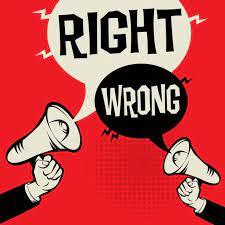I’m very moralistic. Not a claim of personal morality; rather, another applicable word is judgmental.

Some decades ago, non-judgmentalism was the thing. We weren’t supposed to judge people; this was especially true in academia. I considered that loopy, because humans are evolutionarily programmed to be judgment machines; distinguishing good from bad, right from wrong, being needful for our living in social groups.
Of course — especially in academia — nonjudgmentalism has since been supplanted by its antithesis — a harsh short of moralistic judgmentalism. That’s “cancel culture.” Such moralism has also infected our politics, with growing numbers of both Democrats and Republicans deeming the other party not just wrong but evil.
At one time I considered Democrats the chief culprits, their demonization of Republicans reflecting caricatures. But then Republicans went on to actually fulfill those caricatures; while also going one better in their own demonization of opponents —based again on caricatures, this time rather more fantastical.

That, at least, is my view of things, recognizing that others may differ. I see an asymmetry: while Republican hate for Democrats is based largely on lies, Democrats’ hatred for Republicans reflects the reality. Of great evil, activating my own moralistic judgmentalism.
The same applies to Russia’s Ukraine crime; and to Israel’s Gaza atrocity. More great evils, triggering my moralism.

One is led to invoke Burke’s line that the only thing needed for evil to triumph is good people doing nothing. And I feel justified in my moralistic judgmentalism by a long lifetime of thought and study, giving me a body of knowledge and understanding, a contextual framework for valid judgments.
But recently we watched a YouTube conversation between two of my favorite writers, Steven Pinker and Jonathan Haidt, moderated by Jordan Peterson. A key point was that there’s too much moralism, which can itself be an evil.
Most wars in history, it was noted, have been fought not for material aims or real interests, but for moralistic motivations. That’s very true of Russia’s war on Ukraine, driven by a witch’s brew of perverted moralism.
The problem, as the discussants observed, is that when you think your opponents are not merely wrong but evil, then that can seemingly justify the most extreme measures to defeat them. Especially when, as so often, God is in the picture. A proven recipe for horrors.

We’re not quite there, yet, in America, but we’re getting there. The January 6 insurrectionists were acting with moralistic fervor (however misled and misguided). It’s true of the whole Trump cult. Many literally believe themselves God’s warriors. That’s why our democracy is endangered — their moralism trumps democracy — hence they won’t accept being beaten by votes. The “stolen election” lie was a pretext to legitimize that stance. But even if electoral defeat is incontestable, they still won’t accept it.
As for my own moral fervor, it’s undimmed. But I’m content to vent it by writing, and won’t go out and shoot anyone. Yet, joining a throng to storm the Capitol, if necessary to save democracy, is not inconceivable.
I’m no pacifist. Some things are worth fighting for.
